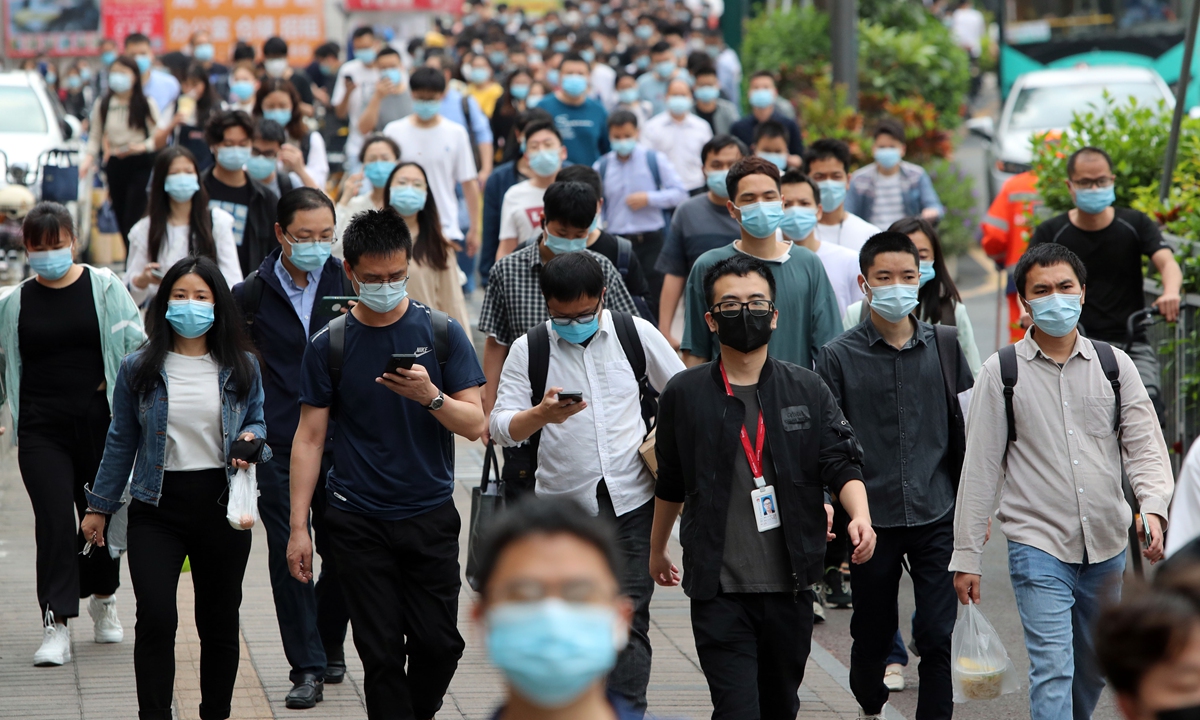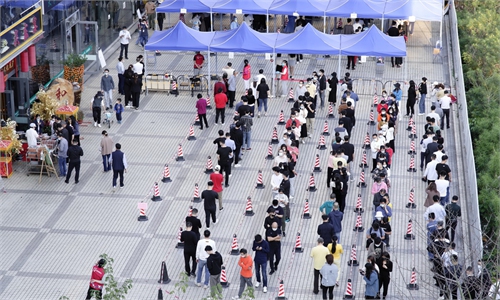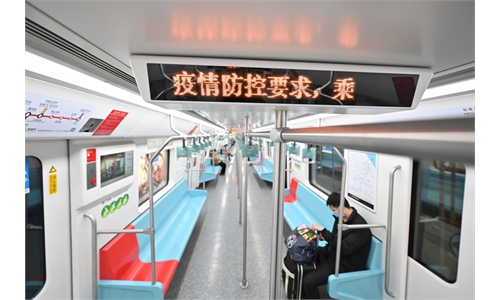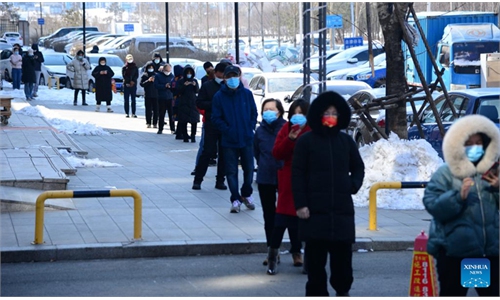
People walk into a hi-tech park in Shenzhen on March 21, 2022, the day when the city resumed production, business and public transport after a week of restrictive measures to quickly curb the COVID-19 resurgence. Photo: Xinhua
As a new round of the Omicron variant hits China, casting a shadow over major cities including Shanghai, Shenzhen, Changchun and Qingdao, so-called pundits in the Western media are again pouring cold water on the government's dynamic "Zero Covid" policy, claiming the policy will force cities to be shut down one after another, seriously harming the world's second largest economy.But the highly transmissible Omicron mutant, actually, requires authorities and the general public to scramble and react even more quickly with effective measures to control any signs or symptoms of infection, in order to cut short the wild spread of the virus among densely populated Chinese cities. The country just cannot afford to let its guard down, as nearly 20 percent of the population in the country's cities are aged 60 or above.
To prevent the pandemic from pummeling the economy, new thinking that protecting people's lives and promoting economic development are mutually reinforcing is beginning to take shape, which will set the agenda for China's anti pandemic effort moving forward.
It is distressing that the US government has largely given up its mandate of mask-wearing and social-distancing, with the number of deaths caused by the pandemic since early 2020 nearing one million there. In other developed Western nations such as Britain and France, victims of the virus are hovering at the tens of thousands.
Ever since the virus' initial onslaught on the country, China has focused on stifling the pandemic from spreading throughout urban centers and rural villages, and deployed necessary resources to extinguish any outbreak, whenever the virus encroached on a city or a village.
The Chinese government prioritizes human life and the coronavirus has prompted authorities make greater efforts to safeguard public health and life. In Chinese culture, human life is valued above all else, and the government is obligated to do all it can in its capacity to secure lives, keeping any harm to human safety at arm's way.
The latest resurgence of infections, with average daily infections reaching more than 3,000 cases, has underscored, once again, why it is important for China to adhere to its dynamic zero-infection policy which, according to China's CDC officials, is aimed at stamping out local outbreaks through early detection, swift response, targeted containment and effective hospital treatment.
During the Beijing 2022 Winter Olympic and Paralympic Games in February and March, the country executed an attentively targeted "close-loop" system that helped control the infection rate at the games at only 0.01 percent, an incredible feat lauded by the International Olympic Committee. And, the system is actually drawn from the country's 28-month experiences in taming the pandemic.
Now, to ensure the success of the national campaign to stamp out new flare-ups in the country, provincial and city governments are required to rigorously follow mass testing, quarantine and treatment protocols. To take ensure daily life can continue to the greatest extent possible, the protocols have been fine-tuned to cause the least disturbance to residents' lives.
In addition, the government has also moved to strengthen healthcare services and find more sustainable ways to address the recent resurgence, such as providing home test kits and antiviral treatments to the public. The national health authority has announced five coronavirus antigen test kits that can be used as a supplementary diagnosis tool to the nucleic acid test in order to improve early detection capability.
Also, to prevent the flare-ups from inhibiting the country's economic growth, the services sector in particular, China's central government has asked local governments to be considerate, refraining from the draconian whole-city lockdowns, which would often produce the most adverse effect on local economies, leaving a majority of people stuck in their homes.
The public has been complying with the anti-pandemic strategy, strictly following the prevention and control measures, for example, by scanning the health code before visiting venues such as malls, supermarkets and restaurants, as well as wearing face masks, and maintaining social distancing. In the cities witnessing a resurgence of cases, people have been cooperating with the government by undergoing mass nucleic acid tests and supporting closed-loop management for residential communities.
In fact, China's policy to coordinate pandemic control measures with economic growth activities is best suited to the country's real-world conditions.
For example, by keeping the numbers of infections and deaths extremely low, compared with other countries, China has helped keep the global supply chains running.
The central government of China is to accord growing importance to ensuring steady economic growth. China was the only major economy to achieve positive growth 2.3 per cent in 2020, and a significant rebound of 8.1 percent GDP growth in 2021. In the coming months, more supportive monetary and fiscal policies will be implemented to help the economy achieve the set target of around 5.5 per cent to stabilize employment.
Additionally, more tax refunds and cuts are expected to be announced to help the enterprises and fire up the economy. Only when the factories are humming and the urban restaurants, pubs, cinemas are filled with customers, and at the same time, keeping the coronavirus infection caseloads at a minimum, could a city thumb the chest to claim a success.
The author is an editor with the Global Times. bizopinion@globaltimes.com.cn



